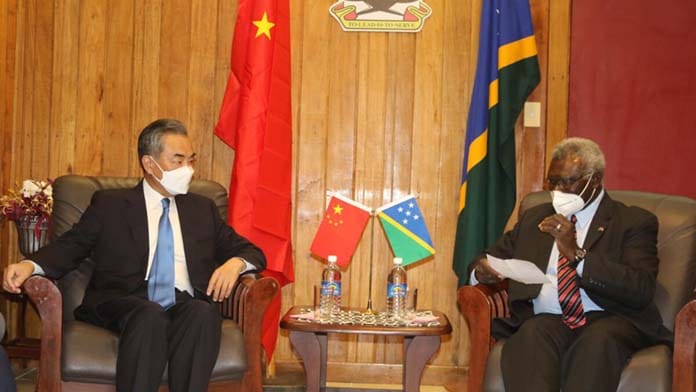China’s security treaty with the Solomon Islands, finally signed this week, has caused hysteria in Australian ruling class circles. Less noted was the significant news that Australia has extended its own military deployment to the Solomons, through the Australian-led Solomons International Assistance Force, until December 2023.
Australia’s High Commissioner to the Solomons, Lachlan Strahan, cut the deal with Solomon Islands Prime Minister Manasseh Sogavare at around the same time as news of the China deal was leaked to the Australian media.
Last November Scott Morrison promised a deployment of Australian troops and police in the Solomons for only “a matter of weeks”. Now the military and police will stay for two years, following a political riot in the capital, Honiara.
Any Chinese military presence in the Solomons, however, is presented as illegitimate and a threat.
The pro-Australian empire journalist, Peter Hartcher, writing in The Sydney Morning Herald, said the China-Solomons deal “would give the People’s Liberation Army navy an operating base deep within Australia’s strategic hinterland”.
Any Chinese presence in the South Pacific “would signal a pretty significant failure of Australia’s long-term security policy”, according to the head of ANU’s National Security College, Rory Medcalf.
Labor leader Anthony Albanese would only echo these establishment concerns, accusing Morrison of a “strategic blunder” and “foreign policy failure”.
Medcalf is quoted as saying, “It’s been an unspoken objective of Australian Defence and foreign policy for 70 years to ensure that no other power could project force against Australia from the South Pacific.”
On this timeframe Medcalf is wrong—it’s more like a 170-year project by Australia’s rulers, with apoplexy any time another power has set a foot in the region, whether it was France, Russia and Germany in the late 1800s, Japan in the 1940s, or the USSR and even Libya during the Cold War.
This is a policy known as “strategic denial”. It is not an issue of defence but of imperialist control.
The US did a similar thing with the Monroe Doctrine for Latin America—insisting that any rival power should stay out because the area was for the US to dominate. Australia has asserted this in similar terms in regard to the southwest Pacific.
Australia, with a population, economy and military power that dwarfs that of nearby Pacific island states, is a bully and exploiter in the region.
This mindset was made explicit by David Llewellyn-Smith, former owner of Australian foreign affairs journal The Diplomat, who said Australia should “invade and capture” the Solomons to “engineer regime change in Honiara” in order to overturn the deal.
Australia’s rulers try to normalise their efforts by arguing they have a “natural right” to a military and economic presence in the region, while denying their rivals have any legitimate reason to do so.
But China has a $825 million investment in the formerly Australian-owned Gold Ridge mine as well as in other infrastructure in the Solomons that it no doubt wants to protect.
The Solomon Islands are 2000 kilometres from Australia, hardly on our doorstep. Few countries in the world have the luxury of excluding others from such a large area. It takes a special kind of paranoia, arrogance and entitlement for Australia’s rulers to believe they deserve more than a 2000kms buffer from any potential adversary.
Concerns
Even after sending a parade of officials to the Solomons the Australian government could not change Sovagare’s mind about the deal. The head of ASIO, Paul Symon, and the head of the Office of National Intelligence, Andrew Shearer, both visited to plead “Australia’s core security concerns”. Australia’s Minister for the Pacific, Zed Sesleja, left a hotly-contested ACT Senate race to go to the Solomons for “urgent talks” with its PM.
This has produced concerns among ruling circles that Australia’s historic sub-imperial control of the region has been undermined so easily by China.
China clearly wants to compete with Australia for strategic influence in the southwest Pacific. But fears of an imminent Chinese military base in the Solomons are overblown.
Tarciscius Kabutaulaka pointed out in The Interpreter, published daily by the Lowy Institute in Australia, that China already has a security arrangement with Fiji dating back to 2011.
Further, Kabutaulaka wrote, “China is unlikely to build a naval base in Solomon Islands. Foreign military outposts are not how Beijing operates. It currently has only one overseas base in Djibouti in the Horn of Africa. This is in contrast to the United States, with an estimated 750 bases in 80 countries.”
Astutely, he added, “The reaction from Washington, Canberra and Wellington has been framed largely by the ‘China threat’ narrative and the need to protect their traditional dominance in the region.”
As The Age reported, “There is serious concern within Defence, Department of Foreign Affairs and Cabinet about the precedent it sets for countries such as Papua New Guinea and Vanuatu, which are also being courted by China.”
Solomons’ Opposition leader Matthew Wale explained why Australia is losing out to China, “The US, Australia and New Zealand have, to varying degrees, been neglectful in the region over the past decade—particularly regarding the existential threat posed by climate change.”
Pacific island anger at Australia’s attitude to climate change crystallised over a “joke” by Peter Dutton, then Immigration Minister in the Abbott Government, during a Pacific Islands Forum meeting in Port Moresby, PNG, in 2015.
With a meeting running late Dutton sneered to Tony Abbott and then Social Services Minister Morrison that, “Time doesn’t mean anything when you’re about to have water lapping at your door.”
Australia has continually made it clear that it doesn’t care about the threat climate change poses to the very existence of some of the Pacific island states. Australia’s rulers only ever have their own interests in mind.
By Tom Orsag






